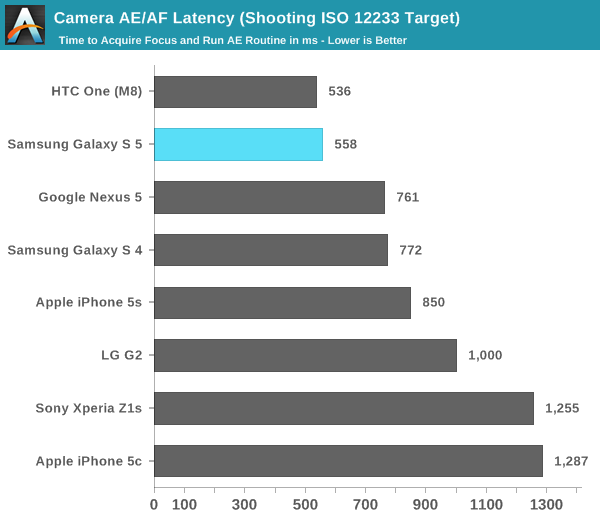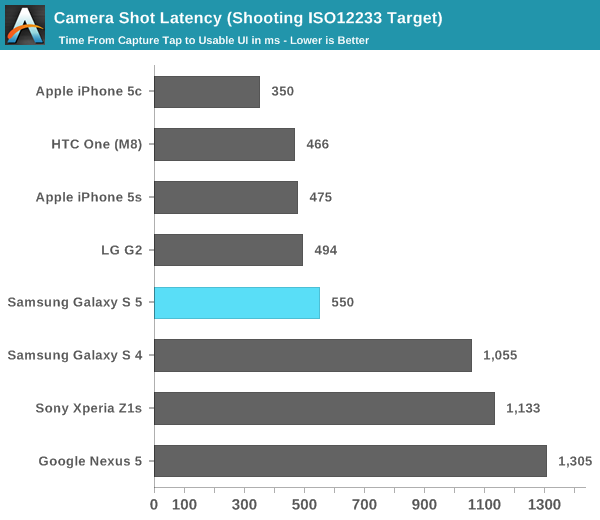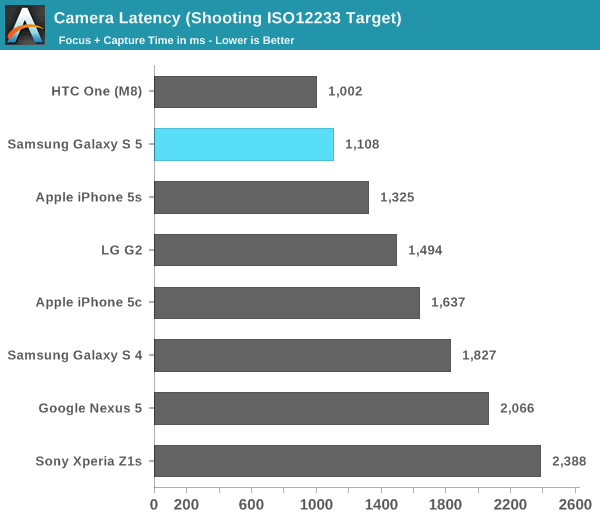Samsung Galaxy S 5 Review
by Anand Lal Shimpi & Joshua Ho on April 8, 2014 12:00 AM EST- Posted in
- Smartphones
- Samsung
- Mobile
- Galaxy S 5
Capture Latency
Along with its own rear facing camera sensor, the GS5 adapts a dual-mode autofocus system. Traditional AF designs in smartphones rely on testing contrast differences in order to determine when a point is in focus. With GS5, Samsung introduces a second mode: phase detection auto focus. Instead of relying (primarily) on contrast to determine focus, PDAF splits incoming light and compares intensity patterns to determine focus direction.
Low light scenes and scenes that can't generate appropriate phase info will default to contrast AF. PDAF appears to work across the camera's FOV although I did notice that the fastest AF times almost always happened in the center of the display.
Samsung claims a 300ms AF time thanks to its phase detection AF. In order to validate that claim I pointed a camera at a bunch of phones and measured AE/AF latency while preparing our ISO 12233 target shots from the previous page.
I measured from the moment I tapped the focus target to the time the image stopped moving (I didn't rely on the AF lock indicator as some devices report focus lock prematurely). There's a bit more variance than I'd normally like in these numbers due to the nature of the capture, although I'm working on getting a higher speed camera to smooth some of that out.

The GS5 definitely runs its AE/AF routine quickly, basically tying the M8 at the top of the charts here. The improvement over the GS4 is substantial, and there's even a big advantage over Apple's iPhone 5s. Note that if you move to lower light conditions you can see this number at least double, but that's something that impacts all of the devices here.
The Z1s is pretty frustrating because it has a great imaging system but an absolutely terrible camera UI. Focus speed is pretty bad compared to anything else here, basically on par with the iPhone 5/5c.
The shortest time to focus I was able to record on the GS5 was 450ms in a different test scene, compared to 516ms for the M8. The GS5 can definitely be a hair faster but I found the M8 to be comparable if not slightly quicker overall.
Focusing is just one piece of the puzzle, I also measured capture latency as well. Here I'm looking at the time between when I tapped the capture button on the screen and when the camera UI was ready to take another shot.

The GS5 remains solid, but here Apple actually pulls ahead. The 5c (and 5 by extension) are actually at the top of the charts here. Apple does some more work upon capture on the 5s, which is the only reason I can think of for the discrepancy here. Either that or the NAND on my 5s is in a dirtier state, impacting capture performance.
Either way there's a huge improvement in capture speed compared to the GS4. Capture latency is one area where the Nexus 5 is absolutely horrible in. The latest updates made AE/AF reasonably responsive, but the capture latency kills the experience on the N5.
This next chart combines the previous two values to give an overall picture of capture latency on these devices:

Samsung's PDAF and ISP companion seem to do their job well as the GS5 is substantially quicker than the GS4 at image capture. That being said, HTC's M8 is slightly faster by comparison.










296 Comments
View All Comments
theduckofdeath - Wednesday, April 9, 2014 - link
If you don't understand what Android is, I really don't see why I should discuss it with you.Android is a free to use open source platform. This means, manufacturers has to compile the code to their specific hardware, which takes a few months. NO ONE IN THE REAL WORLD CARES ABOUT THIS DELAY NIVA. NO ONE.
People who are been obsessed with stock experience pushed to their phones the minute Google announces a new update buy a Nexus phone. Everyone else buys the phone they feel best suits them. Most people teds to buy Galaxy S phones, simply because they are the best, and one of the very few with an OLED display.
Skinning Android is a necessity to create a feeling of an ecosystem the buyer feels at home with. For instance, I could never live with the skin Sony crams into their phones, in my opinion it's ugly in really incoherent. I have a Nexus tablet too, but I prefer TouchWiz, simply because it gives you a lot of really, really useful add/on features.
Anyone arguing a Nexus phone is the only choice, just because it has stock Android doesn't understand what a smartphone is. The Nexus 5 is a mediocre phone. At best.
jezzgoodwin - Wednesday, April 9, 2014 - link
I have to agree with the parents here. The Samsung Touchwiz UI suffers from lots of stuttering when in motion. When doing simple things like sliding between home screens, there is stutter.My friend has an HTC One which has a different UI and his phone is really smooth when doing transitions.
The Samsungs are brilliant phones, but they should really fix the stutter.
theduckofdeath - Thursday, April 10, 2014 - link
Try putting the exact same widgets on those two phones when you scroll. TouchWiz doesn't stutter from simple scrolling. However all operating systems stutter for instance when information has to be swapped from storage to RAM. Even my 8GB quadcore Haswell desktop PC does that fairly often.You should really try one out for real instead of basing your ideas off something you've basically read on a forum on the internet.
Kidster3001 - Wednesday, April 30, 2014 - link
Just use a different launcher from Touchwiz. My Note2 struggles a little in Touchwiz. I use Nova Launcher now and everything is much smoother. No root required, just install it and set as default launcher.Latzara - Wednesday, April 9, 2014 - link
pls --- a Nexus is on par with the currently leading phones for about 2/3 of the price -- that doesn't a mediocre phone make. And the usefulness of the Touchwiz addons is completely subjective -- had a Galaxy S and an SIII and in both cases it wasn't long till i flashed a custom ROM to get rid of all the crammed in usefulness...Don't paint a product with your personal experience and then extrapolate to everyone else. It just doesn't work that way and if you had any intention of being fair you'd know that. I don't like Touchwiz. Some do (i.e. you) but you can't argue that they add a bunch of apps that aren't directly tied to core functionality (like messaging for example which can't be removed) without even giving you a choice to uninstall what you deem unnecessary .... Lack of choice is always a grade down for me. I don't need the multitude of hubs for this and that and i can't get rid of them.
and btw, on the "NO ONE IN THE REAL WORLD CARES ABOUT THIS DELAY NIVA. NO ONE." part -- there is a large modding community that begs to differ ...
theduckofdeath - Thursday, April 10, 2014 - link
The Nexus phones are nice. But they are not on par. They're good value high/end phones, where the manufacturers cuts corners on pretty important things like display quality, camera and other things that are not easy to present in tech specs but are pretty obvious when you use them.Max(IT) - Saturday, April 19, 2014 - link
You are right, nexus aren't on par: they are better. When it comes to build quality, Samsung's devices disappear. A nexus 5 is far better build than a 700$ Galaxy S5 ....The nexus 5 isn't perfect, for sure. Battery and camera aren't the best on the market, but still is superior to any Galaxy S .... at a lower price point.
Stock Android makes it fast and responsive, without tons of gimmicks added by Samsung.
The only Samsung I would consider is a GPE.
theduckofdeath - Friday, April 25, 2014 - link
Build quality is better in the Nexus 5? Just because it's different materials, it definitely does not mean it's better built. The GS5 is IP67 certified, which actually requires higher precision and build quality than, you know, no IP certification.... :)DiHydro - Friday, April 25, 2014 - link
I work for a company that has IPX certified our products just this year, and I know first hand that IPX certification does not account for build quality or materials. I could get a cellphone made with cardboard and cellophane tape IP67 certified. This doesn't mean it is durable or well made.Kidster3001 - Wednesday, April 30, 2014 - link
I'd much rather have my plastic phone that bounces a little than a metal one. My personal opinion.